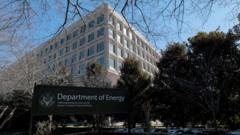The U.S. government is reconsidering its decision to terminate nuclear safety personnel following alarms raised over potential risks to national security. The National Nuclear Security Administration (NNSA), part of the Department of Energy, let go of numerous employees, raising questions about the implications for the nation's nuclear weapons oversight.
Reports indicate that while over 300 NNSA employees received termination notices, a Department of Energy spokesperson has clarified that the actual figure is "less than 50." These layoffs coincided with a broader initiative by President Donald Trump aimed at curtailing the size of the federal workforce—a campaign initiated early in his administration.
Media sources noted that the terminated staff included those working in essential facilities associated with nuclear weapon development. The reports of mass layoffs sparked immediate concerns, leading to attempts by the administration to rehire some of the dismissed employees. However, these efforts have faced hurdles; many employees have been cut off from their official email accounts, complicating communication about the rescinded terminations.
An internal memo from the NNSA explicitly addressed the situation, instructing remaining staff to relay information about job reinstatement through personal communication channels. This memo reflects the entangled logistical challenges caused by the abrupt layoffs, as the administration scrambles to manage the fallout.
In addition to the NNSA's cuts, nearly 10,000 federal employees have reportedly lost their jobs across various agencies recently. This action appears as part of a wider strategic move by the Trump administration to streamline governmental operations, which has led to over 60 legal challenges since the inauguration.
As the Trump administration continues to pursue spending reductions, with high-profile assists from figures like Elon Musk’s Department of Government Efficiency (Doge), ongoing debates about job security and the future of federal employment raise significant concerns, particularly in sensitive security sectors such as nuclear oversight.



















